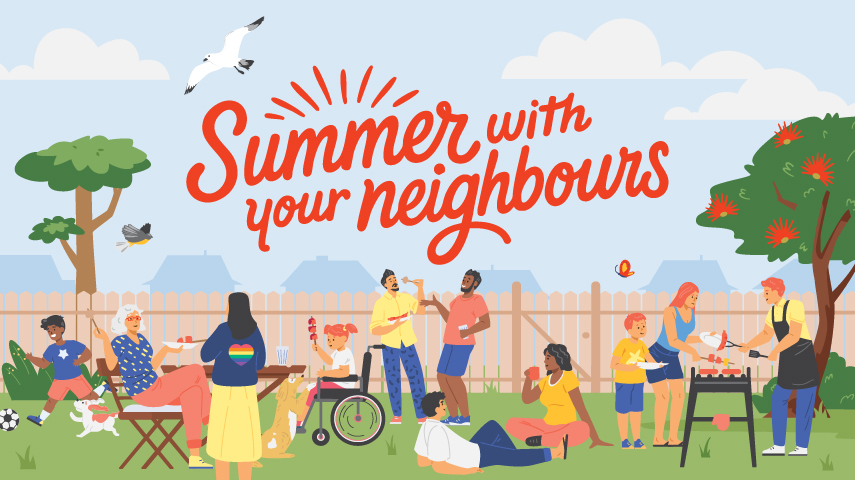Summer with your neighbours brings people together, and now runs for the entire summer. This year's events can be held from 25 October 2025 to 30 March 2026.

Applications for the following community boards have now closed, and applications will be presented to the community board for consideration:
- Waitai Coastal-Burwood-Linwood
- Waipapa Papanui-Innes-Central
- Waimaero Fendalton-Waimairi-Harewood
- Waihoro Spreydon-Cahsmere-Heathcote
- Te Pataka o Rakaihautu Banks Peninsula
The Waipuna Halswell-Hornby-Riccarton Community Board is still accepting applications until 26 March 2026. Please email your application to halswell.hornby.riccarton@ccc.govt.nz.
Have you ever wanted to organise a neighbourhood gathering? Do you want to get to know the people who live close to you? Perhaps you've always wanted to put on a potluck for the whole street?
Summer with your neighbours is about bringing people closer together and celebrating the unique and diverse mix of each neighbourhood.
Neighbourhood Week was the brainchild of the Shirley-Papanui Community Board (now known as the Papanui-Innes-Central Community Board), which held the first event in 1998. This popular event has grown from year to year and is promoted by the Council.
Five years ago, we extended the event for the whole summer after feedback from our applicants, and it is now known as Summer with your neighbours.
Download your Summer with your neighbours save the date [PDF, 328 KB] and invitations [PDF, 634 KB]. Fill them out and send them around the community for your event.
Please note that the Waipuna Halswell-Hornby-Riccarton Community Board is still accepting applications until March 30 2026. Please email your application form [PDF, 328 KB] to halswell.hornby.riccarton@ccc.govt.nz.
All other community board applications for funding for Summer with your neighbours opened on Saturday 12 July and closed Sunday 10 August 2025.
Read the summer with your neighbours guidelines [PDF, 173 KB].
| Stages | Checklist |
|---|---|
| Getting started |
|
| Planning |
|
| A week before |
|
| On the day |
|
| After the event |
|
Street party
Organising a street party is a great way to get to know all the neighbours living in your street. To make it a little more fun you can have a theme or fancy dress.
Welcome new neighbours with a potluck
Friendly faces and knowing people by name is a great way to start out life in a new neighbourhood and will make your street safer in case of an emergency.
Neighbourhood sports day
Organising a sports day is a fun and active way to get the neighbours together, and with a little thought young and old can participate.
- See what equipment is available within your neighbourhood, for example; cricket sets, petanque, badminton
- Think about hiring equipment. Some organisations have sports equipment for hire for a small fee
- Think about activities for children, such as musical chairs, egg and spoon races, or balloon games
- Organise chairs for older members
- Decide whether equipment will be set up or if you will hold a mini-tournament
- Think about after activities such as a barbeque and prize giving with certificates
Start a community project to give back to your area
There are lots of examples of great community projects happening in neighbourhoods. From fundraising for local sports teams and social clubs to community gardens and graffiti removal for the streets.
Check out these community projects:
- Fundraise for your local team, school or social club(external link)(external link)
- Community gardens(external link)(external link)
- Safer Neighbourhoods(external link)(external link)
Walking school bus
A walking school bus(external link) is a safe and healthy way to get the children to school. It also helps you get to know the children and parents in the neighbourhood. You can apply for a subsidy to help cover costs for an end of term gathering for your neighbours that take part in the walking school bus.
Neighbourhood clean-up
If you want a make a difference as well as getting to know your neighbours you may be interested in organising a neighbourhood clean-up.
- Identify areas in your neighbourhood that need a clean-up. For example, the beach or river if you live close by
- For cleaning graffiti, you may want to contact the Council Graffiti team
- Provide or get people to bring gloves and rubbish bags if you are collecting rubbish
- If you are near water ensure that parents keep an eye on their children
- Decide how and who will dispose of the rubbish
- Think about any post-clean-up activities such as a picnic or barbeque
Monster street garage sale
Ever wondered what to do with all that clutter in the garage? Get a few of the neighbours together, organise a street garage sale and apply for a subsidy to help cover costs for a gathering afterwards.
- Set a date and time
- Think about how you will advertise the garage sale. Use a local residents’ association newsletter, local school or church newsletter or bulletin board, or the traditional sign at the end of the street can be just as effective
- Organise a collection time for bringing together things to sell
- Allocate tasks for the day, people might be on a rota for the day
- Decide on how the money will be distributed. You might decide to keep track of who sells what or use the money for a street get together
The Council has community facilities which are available for hire for a small fee
You can also book a park or reserve.
